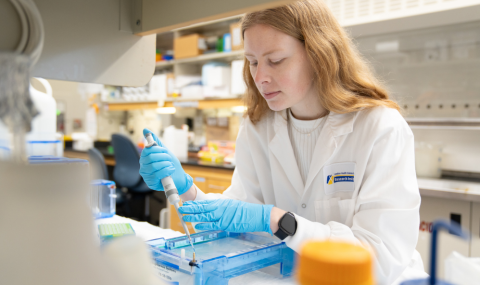Congratulations to the 2025-2026 Breast Cancer Canada Translational Research Unit (BCC-TRU) Traineeship Awardees!

Isabel Kannampuzha is an MSc student in the Department of Anatomy & Cell Biology, working under the co-supervision of Dr. Armen Parsyan and Dr. Alison Allan. Isabel's research focuses on two proteins, Polo-like Kinase 4 and Artemis, to understand how targeting these proteins could help triple negative breast cancer become more sensitive to radiation therapy. She aims to research how these proteins play a role in cancer growth and response to radiation. This research will help inform and develop new therapies and drugs to improve outcomes for breast cancer patients.

Jeri Spilberg is an MSc student in the Department of Anatomy & Cell Biology, working under the supervision of Dr. Alison Allan. Her research is focused on understanding why breast cancer cells spread or metastasize to specific organs such as the lung, brain, bone and liver. Previous research has shown that hypoxia - when cancer cells don’t receive adequate amounts of oxygen - helps enhance their ability to metastasize. Jeri is studying a specific family of proteins called integrins which are involved in aggressive breast cancer cell behaviors such as migration, invasion, survival, and metastasis. She is investigating the differences between the integrins that are expressed during hypoxia that result in metastasis to different organs. This research may provide insight into new biomarkers and/or treatments aimed at preventing or treating breast cancer metastasis in the future.

Yubing Xia is an MSc student in the Department of Anatomy & Cell Biology, working under the supervision of Dr. Vanessa Dumeaux. She is investigating how the immune system responds to aggressive forms of breast cancer, including HER2-positive and triple-negative subtypes, during treatment. By analyzing both blood and tumor samples, Yubing aims to improve how we predict who will benefit from therapy and guide the development of more personalized, less toxic treatments for breast cancer patients.

Sadia Khan is an MSc student in the Department of Epidemiology & Biostatistics, working under the co-supervision of Dr. Philip Blanchette and Dr. Jacques Raphael. Her research is investigating the impact of post-surgery bisphosphonate therapy on survival outcomes, fractures and utilization patterns among women with curable, early-stage breast cancer in Ontario. This study will provide a greater understanding of whether age, sex, cancer stage, receipt of chemotherapy, type of bisphosphonate, time to initiation of treatment, and duration of therapy influence treatment response. This project will improve real world understanding of the clinical benefit of post-surgery bisphosphonate therapy and optimize best practices for breast cancer patient care.

Nitara Fernando is a PhD student in the department of Medical Biophysics, working under the supervision of Dr. Paula Foster. Her research focuses on the spread – or metastasis - of breast cancer. When cancer metastasizes, it often spreads first to nearby lymph nodes (called the sentinel lymph nodes), making their detection crucial. Current methods for mapping sentinel lymph nodes involve using radiotracers and nuclear imaging, which have limitations including radiation exposure and a short half-life. Her project aims to develop a new imaging technique using Magnetic Particle Imaging (MPI) to directly detect sentinel lymph nodes in breast cancer and combat limitations with current methods. Nitara is also partially supported by an external Ontario Graduate Scholarship (OGS).

Anayra Gonçalves is a PhD student in the Department of Anatomy & Cell Biology, working under the supervision of Dr. Armen Parsyan and Dr. Alison Allan. She is using advanced techniques known as spatial omics to create detailed maps of the changes in molecules produced by cancer cells and nearby non-cancer cells within breast cancer tissue. Anayra’s research aims to identify new biomarkers linked to the spread of triple-negative breast cancer (TNBC) to lymph nodes and its resistance to chemotherapy. Ultimately, these biomarkers could lead to more personalized treatment plans and the development of more effective drugs for TNBC patients. Anayra is participating in the BCC-TRU Program as the recipient of a full scholarship funding from Small Town Cancer Fighters.

Yan Yi Li is a PhD student in the Department of Biochemistry, working under the supervision of Dr. Pingzhao Hu. Her project uses artificial intelligence (AI) to design new drugs that stop a protein called Pin1, which plays a key role in driving triple-negative breast cancer (TNBC) growth and spread. By learning from existing drug data and specific TNBC knowledge, this AI model could support the discovery of safer, more effective treatments for TNBC patients. In the long term, this approach may also help accelerate drug discovery for other types of cancer.

Urvi Patel is a PhD student in the Department of Anatomy & Cell Biology, working under the supervision of Dr. Alison Allan. Urvi’s research is investigating mechanisms of metastasis to the lung, which is a common location for metastasis in triple negative breast cancer (TNBC) patients. In particular, she is investigating tiny particles released from breast cancer cells called extracellular vesicles (EVs) which can alter the lung to promote breast cancer metastasis. Urvi’s research will provide a greater understanding about the mechanisms underlying how EVs influence the lung, and whether therapeutic inhibition of EVs can reduce lung metastasis. In the future, such therapeutic strategies could be applied to improve clinical outcomes of patients with breast cancer. Urvi is participating in the TBCRU Program as the recipient of full funding from a CIHR Canada Graduate Scholarship (Doctoral).

Alfredo Varela Vega is a PhD student in the Department of Biochemistry, working under the supervision of Dr. Pingzhao Hu. His project focuses on developing a biological knowledge-aware artificial intelligence (AI) foundation model that learns from large genomic datasets across multiple cancer types, with the goal of identifying key molecular characteristics of metastatic breast cancer. This tool could help predict whether breast cancer might spread, and support treatment decisions using genomic data to provide a more complete understanding of a patient’s condition.

Dr. Modeline Longjohn is a Postdoctoral Research Fellow in the Department of Anatomy & Cell Biology, working under the supervision of Dr. Alison Allan. Modeline will be investigating how breast cancer cells spread, by looking at proteins called integrins and their relationship with tiny particles released from breast cancer cells called extracellular vesicles (EVs) when exposed to conditions of normal and low oxygen. The functions of the identified EV-associated integrins will then be tested using special assays to understand their importance in breast cancer spread. The results of this research will enhance understanding of how breast cancer spreads and provide a basis to developing new breast cancer treatments targeting EVs and/or integrins.


